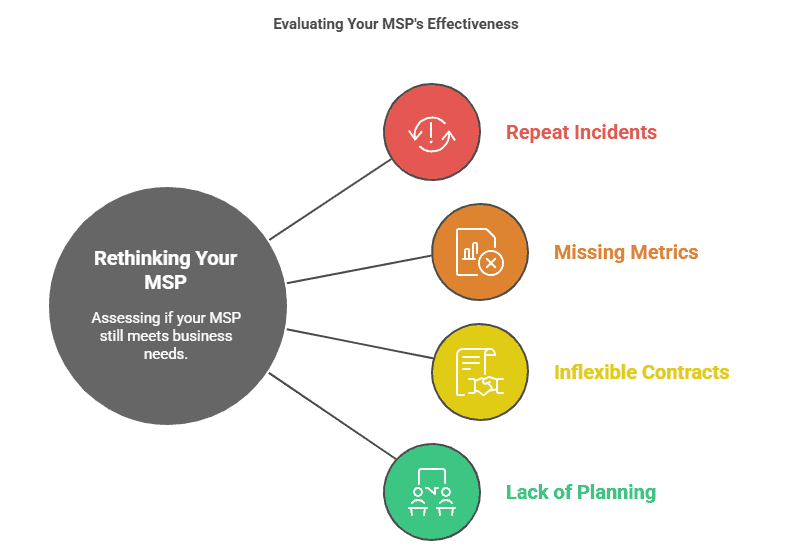
What IT Managed Services Challenges Reveal About Your MSP
Businesses rely on managed services to keep systems running, protect data, and free up internal teams. Yet, many still face repeated downtime, rising costs, and frustration.
77% of SMBs now see greater IT complexity, but often, that complexity isn’t the real issue. The bigger problem is misalignment between the provider and your business needs.
Kevin White, CEO of TRINUS, says, “You can’t fix what you don’t measure, and many providers skip that first step.”
We’ll explore the most common IT managed services challenges, why they keep happening, and what businesses can do to prevent them.
Stop Recurring IT Managed Services Challenges Now!See how TRINUS cuts repeat issues, secures systems, and aligns IT with real goals |
Overpromising That Breaks Trust
Many MSPs promise too much without the track record to back it up. They talk about “unlimited support,” “proactive management,” or “zero downtime,” but don’t show data that proves these claims. Over time, this erodes trust because promises remain just words.
Key issues include:
- Vague commitments: Providers make broad claims but avoid measurable targets. Without proof, you can’t hold them accountable.
- No historical data: If a provider won’t share response and resolution times, it likely means they don’t track them well.
- Sales over substance: The focus is often on signing contracts instead of delivering real operational improvements.
To build trust:
- Ask for average response and resolution times for the past 6–12 months.
- Request real client case studies, showing before-and-after metrics.
- Insist on SLAs tied to specific numbers, like first-call resolution rates or time-to-fix targets.
A provider who welcomes this level of transparency shows they take accountability seriously.
Hidden Costs That Drain Budgets
Ideally, managed services have the potential to slash IT costs by 25%. Flat-rate pricing should protect your budget. Yet, many businesses still get surprise invoices. These extra costs often appear after onboarding, during growth, or when unexpected issues arise.
Where hidden costs show up:
- Outside contract scope: Charges for devices or users not originally counted.
- Project fees: Extra billing for updates, migrations, or advanced troubleshooting.
- Usage-based add-ons: Extra storage, cloud backups, or licensing fees that weren’t discussed upfront.
To avoid this:
- Ask for an itemized proposal listing every covered service.
- Clarify what triggers an extra fee and what stays covered under a flat rate.
- Review your environment quarterly with the provider to update contracts as your needs change.
Transparent MSPs don’t avoid these discussions; they lead them, keeping costs predictable.
Poor Tooling and Weak Processes
Outdated tools and manual processes slow down IT response and leave gaps. Many MSPs rely on legacy systems that generate excessive alerts or overlook critical data, rendering real prevention impossible.
What this looks like in practice:
- Recurring tickets: The same issues come back because providers only treat symptoms.
- Slow patching: Without automation, updates fall behind, increasing security risk.
- No integration: Separate monitoring and ticketing systems require technicians to switch tools, which delays fixes.
Modern MSPs invest in:
- Automation to handle patches, backups, and routine updates.
- Integrated systems where alerts become tickets automatically, reducing time to resolution.
- Analytics that show recurring issues, allowing root-cause analysis.
Ask your provider what tools they use, how they automate, and how they share performance data. This keeps your IT environment stable instead of reactive.
| More articles you might like: |
Security Gaps from Weak Internal Controls
Guardz found that 47% of MSPs feel overwhelmed by the daily flood of security data. Your MSP holds admin-level access to your systems. If their internal processes are weak, it puts your business at risk, even if your security measures are strong.
Common security gaps:
- Uncontrolled remote tools: Access that isn’t protected by multi-factor authentication or strong passwords.
- Inconsistent patch management: Missed updates that leave known vulnerabilities open.
- Lack of documented policies: Without written guidelines, security practices vary between technicians.
A secure MSP:
- Offers monthly penetration testing and shares the results.
- Keeps detailed access logs so every change can be traced.
- Provides cyber warranties (TRINUS offers up to $500,000) to show real confidence in their security approach.
Don’t just ask if a provider “does security.” Ask them to prove it, with documents, reports, and policies.
One-Size-Fits-All Service That Doesn’t Fit
Every business has unique systems, workflows, and compliance needs. Providers who sell standard packages without adjusting them often miss critical details, leading to recurring problems.
When MSPs don’t adapt:
- You spend time explaining your systems again and again.
- Industry compliance risks increase, especially in sectors like healthcare and finance.
- Growth plans stall because the IT support isn’t built for change.
Better MSPs:
- Conduct detailed onboarding assessments and share documentation with you.
- Build support plans around your tools, growth plans, and compliance standards.
- Schedule strategy reviews every quarter to adjust as your business evolves.
Don’t settle for “we support everyone.” Look for “we understand your business.”
Signs It’s Time to Rethink Your MSP

Are you unsure if your MSP still meets your business needs? Watch for these signs:
- Recurring incidents: Problems persist despite being addressed at their root cause.
- Missing metrics: You don’t receive reports on uptime, ticket trends, or patch status.
- Inflexible contracts: Automatic renewals and vague SLAs reduce your ability to hold them accountable.
- Lack of planning: No regular strategy meetings to align IT work with your business goals.
A good MSP brings you insights before you ask. They show numbers, explain what those numbers mean, and adjust based on your input.
If you see these warning signs, it might be time to compare other providers who back up promises with proof.
Questions to Ask Your MSP Before Signing
Asking the right questions early helps avoid common challenges with IT managed services providers later. Use this list to guide discussions:
| Question | Why It Matters |
| What’s included in flat-rate pricing? | Clarifies scope and prevents surprise charges. |
| Do you share monthly performance reports? | Shows commitment to transparency and accountability. |
| How do you secure remote tools and admin accounts? | Directly impacts your risk exposure. |
| What’s your average response and resolution time? | Gives clear benchmarks to measure service quality. |
| Do you tailor services to industry compliance? | Essential for regulated industries like healthcare, legal, or finance. |
| Do you provide cyber warranties or SLAs with penalties? | Adds real financial accountability for missed targets. |
These questions help separate providers who only sell from those who truly support.
Experience Proven Results with TRINUS Managed Services
Real IT managed services challenges come from gaps in accountability, tooling, security, and alignment. Providers who don’t adapt to your needs force you to manage them, defeating the purpose of outsourcing.
TRINUS supports over 80 organizations in Western Canada with:
- Over 40 security controls and monthly penetration testing.
- SLAs backed by financial penalties if targets aren’t met.
- Cyber warranties up to $500,000 on premium plans.
- Proven record of zero ransomware incidents across all managed clients.
| Reliable Managed IT Services Near You |
| Edmonton |
We design our services around your business, not the other way around. Contact us for a free cybersecurity assessment and learn how managed IT can finally be proactive, secure, and fully aligned with your growth.



















